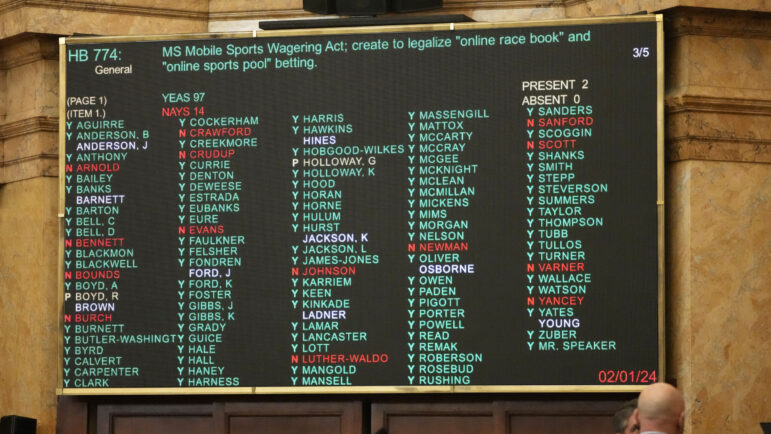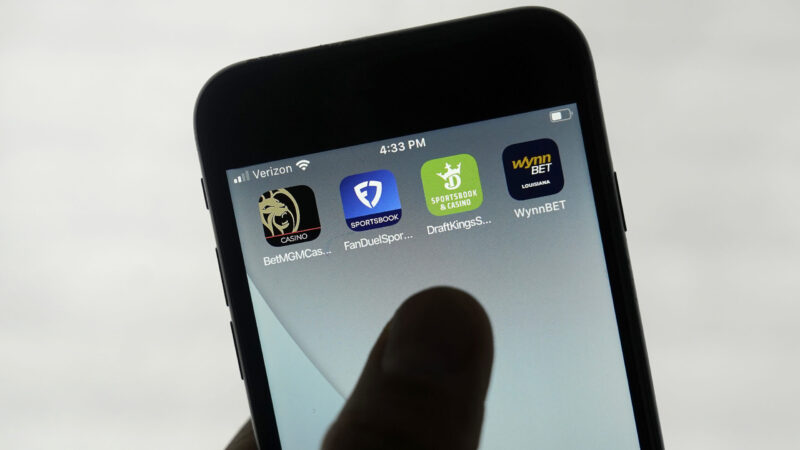As Alabama tries to legalize sports betting, advocates point to neighboring states’ success
In this AP file photo, FanDuel, DraftKings and other online sports betting apps are displayed on a phone, Sept. 26, 2022. Alabama and Mississippi are both trying to pass legislation to legalize online sports betting. (AP Photo/Jeff Chiu, File)
In mid-February, George Musto joined dozens of people who packed into Ghost Train Brewing in Birmingham, Alabama, to watch the Kansas City Chiefs and San Francisco 49ers clash in Super Bowl 58.
Musto is an avid Detroit Lions fan and even went to the brewery wearing his team’s ball cap and jersey, despite the Lions not making the big game. But on this day, he’s a Chiefs fan for one reason — money.
“I put money on the Chiefs, ” said Musto, who divulged that he made his wagers on the game via an online betting app and with a bookie. “I think that’s what it should be all about. It’s… being able to make an extra source of income, and making yourself more excited about watching the game.”
Sports betting in Alabama is illegal, but Musto’s gamble shows that the law hasn’t stopped people from trying to do it.
Last year, the online gambling company FanDuel blocked at least two million attempts by Alabamians to place a bet online, according to Christian Genetsky, the company’s president and a Birmingham native. When those bets were blocked, Genetsky said people likely drove to neighboring states like Louisiana, Mississippi, Florida or Tennessee where sports betting is already legal, or switched to an illegal, offshore site.
Nick Coleman, who was also watching the Super Bowl at Ghost Train, believes it’s time for Alabama to catch up with other states in legalized sports betting. But regardless of its legality, he — and other Alabamians — will probably do it, anyway.
“If that’s what I want to do, let me do it,” Coleman said. “At least put the power in the hands of the people in the state to choose if that’s what they want to do.”
Genetsky’s comments came during a public hearing for two bills proposed by the Alabama House of Representatives during the current legislative session — HB 151 and HB 152 — that propose a state constitutional amendment and companion bill to legalize sports betting, the lottery and casinos in Alabama.
Alabama Gov. Kay Ivey announced her support for the gaming bills in her State of the State address in February, calling them “good for Alabama.”
“It will crack down on illegal gambling and it will responsibly regulate limited forms of legal gaming, including a state-wide lottery,” Ivey said.
Those bills passed through the House in February, but have gone through some changes in the Senate.
HB 151 and HB 152 made it through the House intact but were slimmed down by the Senate — most notably removing the legalization of sports betting and casinos. It’s still not clear if the bills will make it to the finish line, even with the governor’s support, but if they do, it would put the issues in front of voters in a special election on Sept. 10.
The state has attempted to legalize sports betting in the 2019, 2021, and 2022 legislative sessions. Supporters of the bill say that the state is leaving millions of dollars in tax revenue on the table when compared to what sports betting has done for Mississippi and Louisiana — as Genetsky mentioned.
Mississippi allows sports betting in its casinos, but lawmakers are trying to approve mobile sports betting during its legislative session. The state’s House of Representatives passed a measure to allow remote sports betting in early February, and state Senate leaders have until April 2 to pass the measure out of a committee.

Louisiana legalized mobile sports betting in 2021, and it went into effect in 2022. Since then, more than $5 billion has been wagered on sports betting in the state, generating around $85 million in tax revenue.
“It’s just a crazy number,” Ronnie Johns, chairman of the Louisiana Gaming Control Board, said. “It’s much bigger than what we had anticipated.”
Like Coleman, Ivey and others have suggested, Johns said letting Louisiana’s residents decide for themselves helped with the state’s legalization efforts after some unsuccessful attempts before 2021.
“I would allow the people of Alabama the right to decide for themselves by public referendum, whether they want it or don’t want it,” Johns said.
He also said that if Alabama were to legalize sports betting, he recommends the state take its time when implementing it.
Johns said that the state splits the tax revenue between funding early childhood education, local government projects and treatment for people suffering from compulsive gambling.
“We are one of the very few states in America that actually maintains a public facility for compulsive gamblers where, at no cost to them, they can get treatment,” Johns said of Louisiana’s investment in curbing gambling disorders.
The Louisiana Department of Health has a section of its behavioral health website dedicated to gambling disorders, detailing how to spot signs and symptoms of it, resources for how to get treatment and more.
Gambling addiction is a talking point used by many who oppose Alabama’s attempts to legalize sports betting, but the current version of the state’s gambling bill would set some money aside — as Louisiana does — to help people battling it.
The latest version of Alabama’s bills still have a long way to go before they potentially land on Gov. Ivey’s desk. The bills are returning to the House of Representatives, who could agree with the Senate’s changes, or send the bills to a conference committee.
This comes just before the NCAA Men’s Division I Basketball Tournament, better known as March Madness, tips off on March 19. Last year, an estimated $15 billion was wagered during the tournament. Much like the Super Bowl, it’s pretty much guaranteed that gamblers in Alabama will be in the mix of this year’s betting action — whether it’s legal or not.
This story was produced by the Gulf States Newsroom, a collaboration between Mississippi Public Broadcasting, WBHM in Alabama, WWNO and WRKF in Louisiana and NPR.
Mideast clashes breach Olympic truce as athletes gather for Winter Paralympic Games
Fighting intensified in the Middle East during the Olympic truce, in effect through March 15. Flights are being disrupted as athletes and families converge on Italy for the Winter Paralympics.
A U.S. scholarship thrills a teacher in India. Then came the soul-crushing questions
She was thrilled to become the first teacher from a government-sponsored school in India to get a Fulbright exchange award to learn from U.S. schools. People asked two questions that clouded her joy.
Sunday Puzzle: Sandwiched
NPR's Ayesha Rascoe plays the puzzle with WXXI listener Jonathan Black and Weekend Edition Puzzlemaster Will Shortz.
U.S.-Israeli strikes in Iran continue into 2nd day, as the region faces turmoil
Israel said on Sunday it had launched more attacks on Iran, while the Iranian government continued strikes on Israel and on U.S. targets in Gulf states, Iraq and Jordan.
Trump warns Iran not to retaliate after Ayatollah Ali Khamenei is killed
The Iranian government has announced 40 days of mourning. The country's supreme leader was killed following an attack launched by the U.S. and Israel on Saturday against Iran.
Iran fires missiles at Israel and Gulf states after U.S.-Israeli strike kills Khamenei
Iran fired missiles at targets in Israel and Gulf Arab states Sunday after vowing massive retaliation for the killing of Supreme Leader Ayatollah Ali Khamenei by the United States and Israel.








